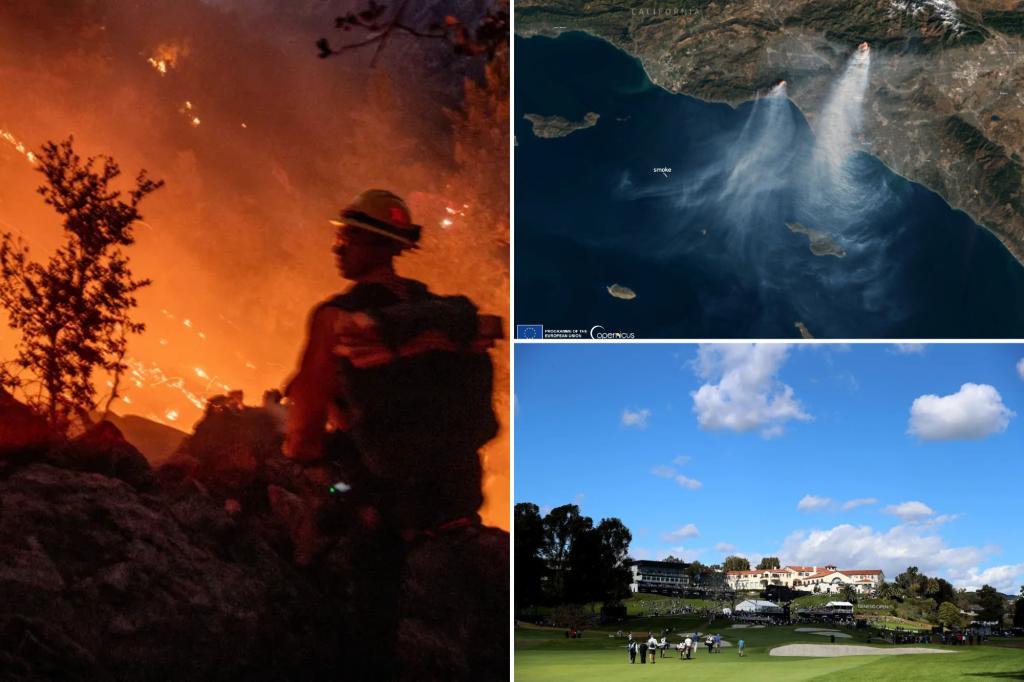The raging wildfires currently engulfing Los Angeles have cast a long shadow over the city’s preparations for the 2028 Summer Olympics, raising concerns about the potential impact on venues and the feasibility of hosting the games as planned. The fires, which have already consumed vast tracts of land and destroyed numerous properties, are creeping dangerously close to key Olympic sites, including the historic Riviera Golf Club, designated to host the golfing competition, and the UCLA campus, the planned location for the Olympic Village. This proximity has sparked anxieties about the safety of athletes, the integrity of the venues, and the overall viability of the games.
The scale and intensity of the wildfires present a multifaceted challenge for the organizers. The Riviera Golf Club, a century-old institution, lies within the evacuation zone, merely five miles from the advancing Palisades Fire. This raises immediate concerns about the course’s condition and its suitability for hosting a prestigious international event. Similarly, the UCLA campus, earmarked to house the athletes, faces a potential threat from the encroaching flames. Damage to these crucial locations would necessitate significant repairs and potentially force a reevaluation of their roles in the games. Beyond these immediate concerns, the continued spread of the fires could endanger other vital venues, such as SoFi Stadium, scheduled to host swimming events, and Carson Stadium, the designated venue for rugby and cycling. Both stadiums, while currently outside the immediate fire zone, could become vulnerable if the fires continue their relentless advance.
The potential disruption to the games extends beyond the physical damage to venues. The smoke and poor air quality resulting from the fires pose a serious health risk to athletes, officials, and spectators. Competing in such conditions could compromise athletes’ performance and even endanger their well-being. Furthermore, the logistical challenges posed by the fires, including evacuations, road closures, and emergency responses, could severely impede the smooth operation of the games. The uncertainty surrounding the fires adds another layer of complexity to the already intricate planning process for such a large-scale event.
Experts and commentators have begun to weigh in on the potential consequences of the fires and the options available to the organizers. Tom Stallings, an Olympics historian, suggests that if any venues suffer irreparable damage, the events could be relocated to alternative locations in close proximity. He expresses confidence in the organizers’ ability to address any unforeseen circumstances and make necessary adjustments well in advance of the opening ceremonies. However, the scale of the current crisis raises questions about the availability of suitable replacement venues and the logistical feasibility of such a large-scale relocation.
Mark Dyerson, another sports historian, presents a more drastic scenario, suggesting that the games could be moved to a different city or even a different country if the fires significantly impact Los Angeles. He mentions Paris, the host of the 2024 Games, as a potential alternative, given its existing infrastructure and recent experience in organizing such a major event. While such a move would be unprecedented in recent Olympic history, it underscores the severity of the situation and the potential for significant disruption. The historical irony of Los Angeles potentially returning the favor to Paris, which hosted the games in 1924 after floods ravaged the Californian city, adds another layer of complexity to the situation.
The current silence from official bodies, including the International Olympic Committee, LA28, and government representatives, adds to the uncertainty surrounding the situation. Their lack of public comment leaves many questions unanswered, fueling speculation and anxiety about the future of the games. The absence of a clear communication strategy from the organizers could erode public confidence and exacerbate concerns about the potential impact of the fires. As the fires continue to burn and the situation remains fluid, the need for clear, timely, and transparent communication from the responsible authorities becomes increasingly critical. The world watches with bated breath, hoping for the best but bracing for the potential consequences of this unfolding environmental crisis on the 2028 Los Angeles Olympics.

